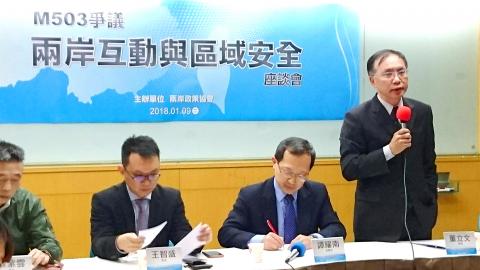China’s move to launch northbound commercial flights on the M503 route compromises the integrity of Taiwan’s airspace, and the nation should reduce cross-strait flights to force negotiations with China while increasing its defense budget and develop asymmetric defense capabilities, academics said yesterday.
China on Thursday last week unilaterally announced the launch of the M503 route, which is 7.8km from the median line of the Taiwan Strait, as well as three extension routes — W121, W122 and W123 — along the southeast coast of China.
China first introduced the M503 route in January 2015 to ease congestion in a nearby route, but its implications on Taiwan’s air defense resulted in one of the most notable cross-strait confrontations of former president Ma Ying-jeou’s (馬英九) term.

Photo: Chung Li-hua, Taipei Times
Following negotiations, southbound flights on the M503 route were launched in March 2015.
An immediate effect of Beijing’s latest move is increased difficulty in identifying military aircraft from commercial planes flying over the Strait, giving Taiwan less time to react to a military threat, Tamkang University Center of Advanced Technology executive director Su Tzu-yun (蘇紫雲) told a news conference held by the Cross-Strait Policy Association.
The Soviet Union in 1983 mistook a South Korean commercial jet that intruded into its air space for a US spy plane and shot it down, and a Malaysia Airlines plane was shot down over Ukraine in 2014, Su said.
Without communication with China, there is a possibility of misidentification, as more than 1.5 million flights traverse Taiwan’s airspace annually, he said.
Furthermore, an airstrike can be launched using a commercial flight route, as was done by Israel in Operation Entebbe in Uganda in 1976 and in Operation Opera in Iraq in 1981, Su said.
To force China into resuming negotiations with Taiwan, Taipei can reduce the number of cross-strait flights, Su said.
The M503 route’s launch is part of China’s “legal warfare,” and Taiwan needs to employ new legal narratives and drop terms formulated under the “one China” framework, Su said.
“The median line of the Taiwan Strait is a term from the [Chinese] Civil War. The narrative has to be revised using the concept of territorial waters and airspace to be convincing on an international level,” Su said.
In addition to the M503 route, “China keeps testing maritime law enforcement in Japanese, South Korean and Taiwanese waters to challenge the ‘status quo’ and create a new ‘status quo,’ which is part of China’s regional strategy,” association secretary-general Wang Zhin-sheng (王智盛) said.
China’s unilateral action provoked a rare criticism from the US Department of State, association president Stephen Tan (譚耀南) said, urging China to return to the negotiation table with Taiwan to discuss aviation safety issues.
Taiwan Thinktank consultant Tung Li-wen (董立文) urged the government to increase defense spending to 3 percent of GDP to purchase the weapons needed to build asymmetric warfare capabilities.
The Chinese aircraft carrier Liaoning sailing around Taiwan’s territorial waters is a test of China’s naval capability to break through the first island chain, and Taiwan should stay prepared, Tung said.
To maximize asymmetric defense capabilities with minimal costs, the military can develop low-cost mobile missile systems or patrol boats armed with advanced missiles, Su said, adding that some nations have developed missile systems that could be fitted on container trucks.

Chinese spouse and influencer Guan Guan’s (關關) residency permit has been revoked for repeatedly posting pro-China videos that threaten national security, the National Immigration Agency confirmed today. Guan Guan has said many controversial statements in her videos posted to Douyin (抖音), including “the red flag will soon be painted all over Taiwan” and “Taiwan is an inseparable part of China,” and expressing hope for expedited reunification. The agency last year received multiple reports alleging that Guan Guan had advocated for armed reunification. After verifying the reports, the agency last month issued a notice requiring her to appear and explain her actions. Guan

GIVE AND TAKE: Blood demand continues to rise each year, while fewer young donors are available due to the nation’s falling birthrate, a doctor said Blood donors can redeem points earned from donations to obtain limited edition Formosan black bear travel mugs, the Kaohsiung Blood Center said yesterday, as it announced a goal of stocking 20,000 units of blood prior to the Lunar New Year. The last month of the lunar year is National Blood Donation Month, when local centers seek to stockpile blood for use during the Lunar New Year holiday. The blood demand in southern Taiwan — including Tainan and Kaohsiung, as well as Chiayi, Pingtung, Penghu and Taitung counties — is about 2,000 units per day, the center said. The donation campaign aims to boost

The Kaohsiung Tourism Bureau audited six hotels in an effort to prevent price gouging ahead of Korean band BTS’ concert tour in the city scheduled for Nov. 19, 21 and 22 this year. The bureau on Friday said that the audits — conducted in response to allegations of unfair pricing posted on social media — found no wrongdoing. These establishments included the local branches of Chateau de Chine, Hotel Nikko, My Humble House, and Grand Hai Lai, it said, adding that the Consumer Protection Commission would have penalized price gougers had the accusations been substantiated. The bureau said the Tourism Development Act

The Central Weather Administration (CWA) said a magnitude 4.9 earthquake that struck off the coast of eastern Taiwan yesterday was an independent event and part of a stress-adjustment process. The earthquake occurred at 4:47pm, with its epicenter at sea about 45.4km south of Yilan County Hall at a depth of 5.9km, the CWA said. The quake's intensity, which gauges the actual effects of a temblor, was highest in several townships in Yilan and neighboring Hualien County, where it measured 4 on Taiwan's seven-tier intensity scale, the CWA said. Lin Po-yu (林柏佑), a division chief at the CWA's Seismological Center, told a news conference